- Home
- M. Louisa Locke
Kathleen Catches a Killer Page 7
Kathleen Catches a Killer Read online
Page 7
Kathleen added, “Patrick says they have books and books of these photographs. He says they call it their ‘rogues’ gallery.’ They even have a clerk whose full time job is to keep the books and records in order.”
“But what does this have to do with Miss Laura taking one of Mrs. Ashburton’s photographs?” asked Mary Margaret.
Kathleen said quickly, “Since you’ve been so worried about the son, Miss Laura had this great idea. Patrick explained to me that lots of times when men are picked up, they give an alias. So the police look through the books to see if the man’s face shows up under a different name. With this photograph, Patrick can check if Mrs. Ashburton’s son has had any criminal record in the time since he left home. A man can change his name, but he can’t completely change his face.”
“Well, I think the son’s face changed a lot over twelve years,” Mary Margaret said. “The way he looked the first night I saw him, I doubt if his own mother recognized him right off with that long dirty hair and big bushy beard and mustache.” Mary Margaret became tearful, bringing her apron up to wipe her eyes.
Laura, who was looking closely at the photograph, said, “Rafe Ashburton certainly looks older than he did in this photograph, as you’d expect if more than ten years have passed…years of hard-living if I’m any judge. However, as much as you can tell from a tiny picture, the features…eyes, nose, mouth…look the same to me. Nothing unusual. Of course, he isn’t smiling in the picture, but no one does in photographs.”
Putting the photograph back down on the table, she said, “Kathleen, do you think Patrick will stop by this evening so you can give the photograph to him?”
“I hope so. He said he wasn’t working at the Silver Strike Bazaar tonight.”
Mrs. O’Rourke patted Queenie and remarked, “I wouldn’t be so certain that Patrick will agree to do as you ask, which to my mind would be using police resources for personal reasons. Besides, I don’t know that Mrs. Ashburton would thank you if the police decided to arrest her son for some crime he committed years ago when he was young.”
Laura said, “But Mrs. O’Rourke, think about it. Why is this the first time he’s been back in over ten years? What if he’s become a hardened criminal during that time? I mean, if he did have an alias, they might discover he’s been in prison or something. Then wouldn’t Patrick, or Officer Stanley, feel compelled to visit his mother…alone…to make sure she’s well and not being taken advantage by him in some fashion? He could be robbing her blind!”
Kathleen knew Laura was thinking about the waves of alcohol they’d smelled coming off Rafe Ashburton, and she had to agree. Even if he wasn’t some awful criminal, just some bounder who was sponging off his aged mother, they needed to be sure the woman was in good health. Surely she would able to use what she and Miss Dawson encountered on their visit to convince Patrick to find out all he could about this particular prodigal son.
Chapter 11
Thursday evening, December 30, 1880
When the bell attached to the Stein’s bedroom rang, Kathleen was happy to answer it and escape the continued discussion of what Rafe Ashburton might or might not be doing in his mother’s home.
Mrs. Stein told her that while her husband Herman was going to stay up and read for a little bit, she was ready to go to bed. The kindly, white-haired woman sighed and said, “You would think, after having six children of my own, and being around for the birth of ten of my grandchildren, I wouldn’t be surprised how tiring the whole process is. But I’m just worn out.”
“Your daughter-in-law and the baby are all well, aren’t they?” Kathleen’s own mother had died in childbirth, along with the baby, so she tended to view having babies with some trepidation.
“Oh my, yes. But my newest granddaughter has quite the pair of lungs on her, so everyone in the house always knew when she was hungry, day or night.”
When Kathleen got back down to the kitchen, she saw that Jamie was there with his dog, Dandy, and she asked if he had enjoyed his day at Woodward’s Gardens.
“Ever so much. But I wish Ian could have come with us. They had this huge Christmas tree, covered with what looked like snow, and some of the animals wore big ribbons around their necks. I even got to ride a pony. No, Dandy, don’t bother Queenie.”
His terrier had discovered the kitchen cat was again hiding behind the wood pile, and he was emitting small yips as his skinny backside wiggled back and forth in gleeful anticipation of a game of chase with the old cat. What was more likely to happen was that Queenie would reach out and slap him hard on his forehead. As far as Kathleen had seen, the cat never unsheathed her claws, so this would simply make the small dog back up in confusion.
Jamie said, “Dandy, come, it’s time for you to go out back and do your business. Mother wants us into bed early.”
“Are you going to sell papers with Ian again tomorrow morning? I heard that the Chronicle is putting out a list of all the ladies who have opened up their homes to formal calls on New Year’s Day.”
“Ian figures this will help increase sales. They are putting out a special eight-page edition.”
“Seems like bragging about how well-off you are to announce to the whole city that you are offering up free food and drink,” Kathleen said, shaking her head.
Mrs. O’Rourke chuckled and said, “You may be sure that these particular ladies have butlers who will only let their friends into the house. Ordinary riff-raff will be politely turned away.”
Mrs. Stein said something similar later on when Kathleen returned to her room with the cup of tea the older woman always had before retiring and asked her if she was looking forward to New Year’s Day.
The older woman said, “Not really. The reason we came back early was that I knew I would need at least twenty-four hours to rest and recruit my strength before spending a whole day going in and out of other people’s homes.”
“Aren’t they your friends?”
“Some of them are, my dear, but most of them are just business acquaintances of Herman’s. Unfortunately, as the day goes on, the women’s feet will hurt and their corsets will begin to pinch, and the men will become increasingly inebriated. Someone will end up saying or doing something inappropriate, which will occupy the gossips until the next social event. I must say, one of the benefits of moving into Annie’s boarding house was knowing I would never have to be hostess for one of these events again.”
Kathleen thought this sounded a lot like her uncles’ parties. The women, who did all the work, would get exhausted and start snapping at the children, and some drunken fight would break out among the men. She just hadn’t thought about this happening at the parties of rich folks. Certainly wouldn’t happen here at the O’Farrell Street boarding house.
Mrs. Stein continued, “Herman finds these sorts of events useful. Says he can tell who’s doing well and who he can trust to do business with by getting a glimpse at their parlors and what their wives are wearing, as well as who seems to be trying too hard to impress. I just find it a bore, and I will be glad to get back here to be among people I care about.”
By the time Kathleen finished getting Mrs. Stein ready for bed, heated and brought up water for Mrs. O’Rourke’s hip bath, checked to see that all the fireplaces were cleaned out and logs laid for the next day, and made sure that Mr. Chapman, Mrs. Hewitt, and the Moffets had everything they needed for the night, it was past nine, and she was beginning to think about her own bedtime.
She hoped that Mary Margaret would be ready to retire early, because if Patrick did come, she wanted a chance to see him alone. Her friend should be worn out, because she’d been spending the time after dinner doing some of the Stein’s wash so it could dry overnight. Kathleen didn’t want the couple to have to wait until Monday’s regular wash to have clean clothes. She would work on getting at least Mr. Stein’s shirts ironed first thing in the morning, before the serious cooking for Saturday started.
As she left the formal parlor, where she’d done her last check of the
tree, she thought to go into the small parlor across the hall where her mistress used to meet her clients as the clairvoyant, Madam Sibyl, and where she now met clients as the accountant and financial advisor, Mrs. Dawson.
The room felt chill from a week of disuse, and Kathleen decided that early in the morning she would open the windows to air out the parlor and the small study that adjoined it. Later, she would light a welcoming fire for the mistress and master, who were coming up from the ranch on the train tomorrow. It would be so good to have them both home.
When she got back down to the kitchen, she found Mary Margaret slumped in the rocker, looking half asleep, and she urged her to go to bed. “I’ll wait another ten minutes, just in case Patrick makes it by.”
“Wouldn’t he have been here earlier if he was going to stop by after work?”
“Not if there was something going on at the station, some new information about the stage coach robbery he’s been working on. Even though he’s only a patrolman, Patrick’s working more and more with the detectives. Sergeant Thompson thinks highly of him,” Kathleen said proudly.
Mary Margaret got up slowly from the rocker and said, “I am pretty tired, and I want to be sharp for Mrs. O’Rourke tomorrow. She’s going to show me how she makes her four-layer chocolate cake.”
“What time do you want me to set the alarm for?” Kathleen asked as she went over and got the kitchen clock down from the shelf and began to wind it.
“Mrs. O’Rourke said she’d be down by six, so I guess your regular time of five-thirty. Oh Kathleen, I’m so worried about Mrs. Ashburton. I wish I could believe, the way Mrs. O’Rourke does, that the son wouldn’t have let you and Miss Dawson in the house if there was anything wrong. She even cautioned me that it was possible he was telling the truth that there was a servant in the kitchen fixing her tea. That he could have hired someone new, maybe someone who he could pay less.”
Kathleen came over and gave Mary Margaret a hug, noting that her friend had lost weight in the past week. She said, “I doubt if that is true…not if you saw the state of the parlor. But he certainly might be regretting having dismissed you so quickly. With my mistress and her husband coming home tomorrow, I’m sure we will be able to get this all sorted out. Now you go, get into my bed; I’ll take the trundle for tonight.”
After her friend left the kitchen, Kathleen set the alarm on the clock, putting it down on the table so she wouldn’t forget it when she retired. She went and opened the back door to look out at the yard. There was no moon in the sky, although the night was so still and clear that she thought she could see the bare branches of the apricot tree silhouetted against the stars. There was a soft click from the back gate, and in a moment Patrick crossed the patch of light that shown out from the lamp sitting in the kitchen window. She opened up her arms, and he came to her, lifting her off the ground to carry her into the warm kitchen, kicking the door closed behind him.
Some time later, she got up off of his lap to go get him some milk and something to eat. Somehow, Mrs. O’Rourke had found time today to make a fresh batch of oatmeal cookies, Mr. Nate’s favorites. Putting some of the cookies on a plate, she said, “I’d almost given up on you. What kept you at the station this late?”
“We’ve finally got a name for one of the men we think pulled off the stage coach robbery. A man who calls himself Maxie Painter had been working on a ranch right outside of Auburn in the month before Christmas. Thing is, this ranch is where the stage coach company stables its horses.”
“So they think this rancher was involved?” Kathleen said, taking one of the cookies and starting to nibble on it.
“No, the rancher is the one who gave Maxie’s name to the Auburn sheriff. Said he’d been thinking about how this Maxie disappeared the night of the robbery and how he’d been real friendly with the coach drivers. Stood them a round whenever they were all in town, that sort of thing.”
“Why did this make the rancher suspicious?”
“He wondered if Maxie was trying to get one of the drivers to tell him if there was something worth robbing on the coach. Something more than a couple of hundred dollars in cash.”
“Something like $4,000 in the newly-minted coins the banker was carrying.”
“Exactly.” Patrick took a long sip of the milk and carefully wiped off his mustache. “Normally, an amount of money like that would have been transported in the Wells Fargo Express box, but the banker must have thought he’d be better off carrying it in a plain valise. The hostler we interviewed said it was his impression that the robbers knew just what to look for.”
“Didn’t you tell me the robbers did take cash and rings and watches from the passengers as well?”
“Oh, they did, and they broke into the Express box too. Thompson says they might have done that so it wasn’t obvious they were after the gold. It’s his opinion that this Maxie Painter is a professional who had everything planned out.”
Kathleen thought for a moment and then said, “Could the man driving the stage coach have been in on the robbery?”
“Not directly, but when the Wells Fargo agent in Auburn started asking questions, he discovered that one of the long-time drivers got good and drunk about two weeks ago. The man admitted he might have told the story about how last year the banker Durbin let him look at one of the newly-minted double eagles he was carrying to Nevada City, on Christmas Day.”
“So this Maxie Painter took a chance the banker would be doing the same thing this year.”
“Must have figured it was worth the risk. And if our suspicions are correct, part of his plan was to pay the two Chileans to exchange horses and then go to Colfax and pretend to take the train east. All that took advanced planning, not something some amateur would think up at the last minute. Although I don’t imagine the robbers planned on the banker getting killed.”
“Oh Patrick, if those horse thieves didn’t have an alibi like they did, you all might have given up looking for the real robbers.”
“Or at least it would have taken us a lot longer to figure things out. It was just Painter’s bad luck that the hostler recognized the horses when the Chileans stopped in Nevada City to get supplies.”
“But now you know the name of one of the robbers.”
“Sergeant Thompson’s sure that Maxie Painter isn’t his real name, but he’s asked the Auburn sheriff to see if he can’t get someone to do a sketch of Painter.”
“Oh, the way Miss Kitty did that drawing of the man at the Silver Strike.” Kathleen recalled how important she’d felt describing the man she’d seen taking small items from the store to Laura’s friend.
“You’ve got it. But maybe even more crucial, tonight we just got word that either this Maxie or the other man with him might have been wounded. Remember how I said the banker had a derringer, got off a shot at the man who was trying to take his money?”
“Yes, but you never said one of the robbers was hit.”
“That’s because none of the witnesses noticed. I suppose they were concentrating on what happened to the banker when the other man shot him.”
“So why do you now think one of them was wounded?”
“Once Thompson decided that the robbers might not have headed east, he asked local police along the westbound route to question Central Pacific employees about any suspicious passengers traveling to Sacramento or San Francisco on the day after Christmas. A conductor on the train that left Sacramento on Sunday afternoon heading here said he noticed a couple of men traveling that day because one of the men seemed so drunk his friend had to help him into his seat. At the time, he just thought they’d imbibed too much Christmas spirits. But after they left the train at the Oakland ferry depot, the porter for that car discovered that the back of the seat where they’d been sitting had a bad blood stain on it.”
“Oh, Patrick, that should make it easier to find the robbers. Did one of the men on the train match the description you have of this Maxie Painter?”
“Unfortunately, both men had
their hats pulled down low and had mufflers pulled up over the lower part of their faces, so the only thing the conductor could say was that he thought one man was shorter and had lighter hair than the other.”
“That’s not much to go on, and you don’t even know which man was Maxie, or if it was him who was wounded?”
“No, not really. We are hoping when the rancher’s sketch arrives in tomorrow’s mail, we can show it to the conductor and porter. And once we get the sketch, Thompson has asked me to start going through our books and photographs, looking to see if I can find someone whose looks matches the sketch. If we can find a record of Painter, maybe even find out his real name, then it will be easier to see who his known associates are, if any of them live here in San Francisco. That would be a real break in the case.”
“Oh, that’s perfect,” Kathleen cried. “I was sort of afraid to ask this of you, seeing how busy you’ve been. But while you’re searching through the records, could you look to see if Mrs. Ashburton’s son shows up?”
Patrick sighed and said, “You’re still worried he’s some sort of criminal, aren’t you? But all right, there’s an index of names. Shouldn’t be too hard to find out if a Raphael or Rafe Ashburton has been in trouble with the law.”
“What about if he used an alias? Like you think this Maxie Painter is doing? It would help if you had a photograph, wouldn’t it?”
“Of Painter? Of course it would.”
“No, I mean of Rafe Ashburton.”
Kathleen leaned across the table to where Laura had left the small silver-framed photograph. She picked it up and handed it to Patrick, who looked confused. “The young man in this photograph is Rafe Ashburton. Mary Margaret’s mistress told her it was taken when he was eighteen, right before he left home twelve years ago. It’s a very clear likeness; he’s not changed all that much since then. Although I’ve been wondering if he hasn’t dyed his hair…it looked unnaturally black to me. He seems to think highly of himself, so maybe he’s one of those men who start to go gray early and try to cover it up.”

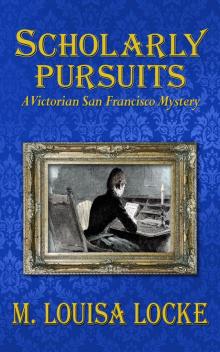 Scholarly Pursuits
Scholarly Pursuits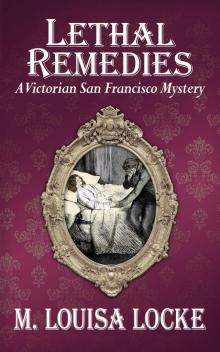 Lethal Remedies
Lethal Remedies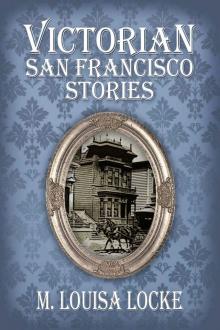 Victorian San Francisco Stories
Victorian San Francisco Stories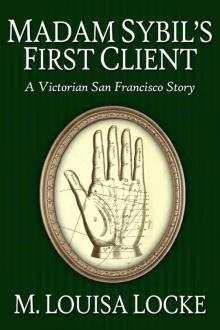 Madam Sibyl's First Client: A Victorian San Francisco Story
Madam Sibyl's First Client: A Victorian San Francisco Story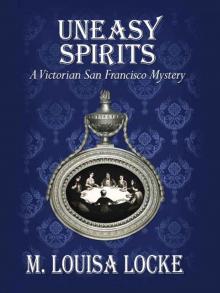 Uneasy Spirits: A Victorian San Francisco Mystery
Uneasy Spirits: A Victorian San Francisco Mystery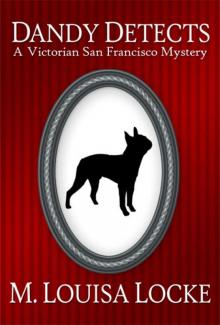 Dandy Detects: A Victorian San Francisco Story
Dandy Detects: A Victorian San Francisco Story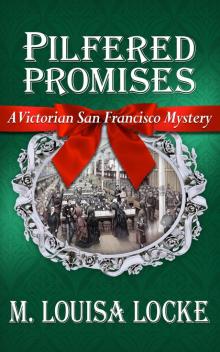 Pilfered Promises
Pilfered Promises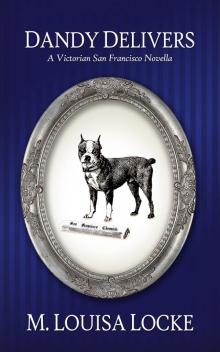 Dandy Delivers
Dandy Delivers Kathleen Catches a Killer
Kathleen Catches a Killer Violet Vanquishes a Villain
Violet Vanquishes a Villain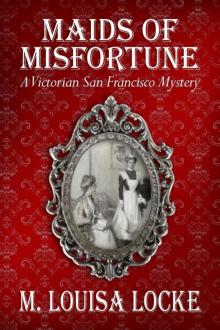 Maids of Misfortune: A Victorian San Francisco Mystery
Maids of Misfortune: A Victorian San Francisco Mystery